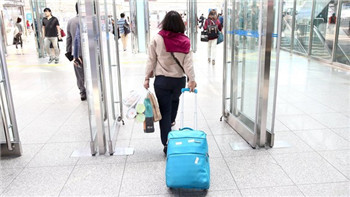(单词翻译:单击)

Park Hee-jung, a 34-year-old pharmaceutical researcher, took an 11-day holiday in May to travel to Croatia and Bosnia with his girlfriend — a relatively long vacation inconceivable for many South Koreans who remain world champion workaholics.
5月份,34岁的医药研究员Park Hee-jung休了11天假,带女朋友去克罗地亚和波斯尼亚旅游。这是相对较长的休假,对于至今领衔世界工作狂排行榜的许多韩国人是难以想象的。
“It was so good to take a long vacation but I am stressed out again because of the mountains of work,” says Mr Park. “The company encourages us to take annual holidays allowed but there are not many people who take them all.”
“休长假太好了,但我又感到很紧张,因为工作负担太重,”Park Hee-jung说。“公司鼓励我们把年假休完,但用完假期的人不多。”
Mr Park is one of the country’s younger generation seeking a work-life balance but even he usually takes up less than half of his allotted annual holidays. He is not alone.
Park Hee-jung是寻求工作与生活平衡的较年轻一代韩国人中的一员,但就连他通常也休不完年假的一半。像他这样的人很多。
Workers in South Korea — home to the longest working hours and highest suicide rate in the developed world — took just 8.6 days of holidays last year on average, the lowest among the 24 nations surveyed by online travel agency Expedia, compared with the global average of 20.5 days and the French’s 30.7 days.
韩国是发达国家里员工工作时间最长、自杀率最高的国家。去年,韩国工人平均只休假8.6天,是在线旅游公司Expedia所调查的24个国家里面最低的,而全球工人平均休假天数为20.5天,其中法国达到30.7天。
Heavy workloads and pressure from superiors have made South Koreans reluctant holidaymakers but there are growing signs that this culture may be changing with big Korean companies encouraging staff to take more time off to boost productivity and creativity, prodded by a government campaign to develop tourism in an attempt to boost sluggish domestic spending.
工作负担重,以及来自上级的压力,使韩国人不愿休假,但有越来越多的迹象表明,这种文化或许开始发生变化。韩国政府发起了一项发展旅游的宣传活动以刺激萎靡的国内消费,受此推动,韩国大企业纷纷鼓励员工充分利用年假,以提高生产率和创造力。
Samsung Electronics is one of the latest. The country’s biggest company by sales said last month it would offer a one-year optional sabbatical for those working for more than three years while extending maternity leave from one year to two years.
三星电子(Samsung Electronics)正是最近这么做的企业之一。上个月,这家韩国销售额最大的企业表示,将为那些工龄超过3年的员工提供1年的可选长假,并把产假由1年延长至2年。
The move follows some other companies such as Doosan, SK Energy, S-Oil and Shinhan Bank that have instituted a compulsory annual two-week holiday.
先于三星采取动作的是斗山(Doosan)、SK Energy、S-Oil石油公司和新韩银行(Shinhan Bank)等企业,它们都推出了每年两周的必休假期。
Shinhan even uses some strong-arm tactics to keep its workaholic employees out of the office during the holiday by locking them out of the computer system while oil refiner S-Oil helps staff to use up all two weeks of mandatory leave by naming a colleague to take the employee’s place while they are away.
新韩银行甚至采取了强制手法——禁止“工作狂”员工在休假期间登录公司计算机系统。炼油企业S-Oil则帮助员工用完两周的必休假期,办法是在员工休假时,指定一名同事顶替其职责。
Several shipyards such as Daewoo Shipbuilding & Marine Engineering also close its entire factories and offices for two weeks over the summer holiday.
暑假期间,大宇造船和船舶工程公司(Daewoo Shipbuilding & Marine Engineering)等造船企业把全部工厂和办公室关闭了两周。
“In a knowledge-based economy, longer working hours do not necessarily mean higher efficiency,” says Kim Pan-jung, a director at the Korea Employers Federation. “We need innovative ideas to add value, so more companies are encouraging their workers to recharge through longer leave.”
“在知识经济中,增加工作时长未必意味着提高效率,”韩国经营者总协会(Korea Employers Federation)的一名负责人Kim Pan-jung说。“我们需要创新的思路来增添价值,所以企业纷纷鼓励员工通过较长的假期给自己充电。”
Mr Kim expects such changes to accelerate as companies want to save compensation costs for unused holidays in the slowing economy while the government tries to create jobs and improve living standards by reducing working hours.
Kim Pan-jung预计这种变化将会加速,因为面对经济放缓,各企业想要省下未休假期的薪酬补偿成本,而政府也在试图通过缩短工时,创造就业岗位并提高生活水准。
South Koreans forged strong work ethics during the country’s rapid industrialisation over the past half a century to transform the war-torn country into the world’s seventh largest trading nation by volume, according to WTO data for 2014. They put in an average of 2,163 work hours in 2013, second only to Mexico among developed countries.
过去半个世纪的快速工业化,把韩国这个饱受战争摧残的国家转变为世界第七贸易大国(据2014年的世贸组织(WTO)数据),在此过程中,韩国人形成了强大的工作伦理。2013年,韩国人均工作时间为2163小时,在发达国家中仅次于墨西哥。
But the OECD says the long hours have not translated into better productivity. In 2012, the latest year for which data have been released, South Korea’s labour productivity per hour worked was just 66 per cent of the OECD average and less than half that of the US.
但经合组织(OECD)表示,工作时间长并未转化为更高的生产率。2012年(已发布数据的最近一个年份),韩国工人的每小时产出仅为经合组织平均值的66%,不到美国的一半。
Under the country’s labour law, South Koreans are entitled to 15-25 days of annual leave but using their full vacation time, especially taking two weeks off at a shot, is not feasible for many of them, especially at small and midsized companies suffering from labour shortages. In the country’s hierarchical Confucian culture, the rank and file will not take holiday unless the boss does too.
根据韩国的劳动法,员工有权享受15至25天的年假,但用完年假(尤其是连续休假两周)对很多人来说是行不通的,特别是在人手紧张的中小企业。在该国等级分明的儒家文化中,除非老板休假,否则普通员工是不好意思休假的。
Kim Jong-woo, a 42-year-old software developer, is entitled to 17 days of annual leave but he usually takes just four days off in the summer. The only time he took a whole week off was when he got married. “I can’t imagine missing two weeks in a row because I don’t want to upset my boss,” he says. “I rather prefer to work through for compensation pay.”
42岁的软件开发者Kim Jong-woo享有17天年假,但他通常只在夏天休4天假。唯一一次连续休假一整周是在他结婚的时候。“我不能想象一下子休两周假,因为我不想让老板不高兴”,他说。“我宁愿上班,得到补偿工资。”
Experts say it will take a long time to resolve the national vacation deficit, unless the government and companies bring in more radical steps to change the culture. “We should shake off this long-held perception that long hours mean hard work,” says Bae Kyu-shik at the Korea Labour Institute. “The laws and systems are there but changing the public attitudes towards holiday is not easy.”
专家表示,解决全国性休假不足问题将需要很长时间,除非政府和企业引入更激进的措施来改变当前文化。“我们应当摆脱工作时间长意味着工作勤奋这一长期看法,”韩国劳动研究院(Korea Labour Institute)的Bae Kyu-shik说。“法律和制度已到位,但改变公众对假期的态度并非易事。”
The omens from the country’s big boss are not good either. Earlier this month, President Park Geun-hye stressed the summer holiday season should be an opportunity to boost domestic spending.
韩国的大领导也发出不好的信号。本月早些时候,韩国总统朴槿惠(Park Geun-hye)强调,夏日休假季节应成为提振国内消费的一个机遇。
She stayed at the presidential Blue House during her five-day break last month as she did during her holiday last year, keeping an eye on national affairs.
上月,就像去年休假时那样,朴槿惠在5天休假期间一直呆在总统府邸青瓦台,关注着国事。


